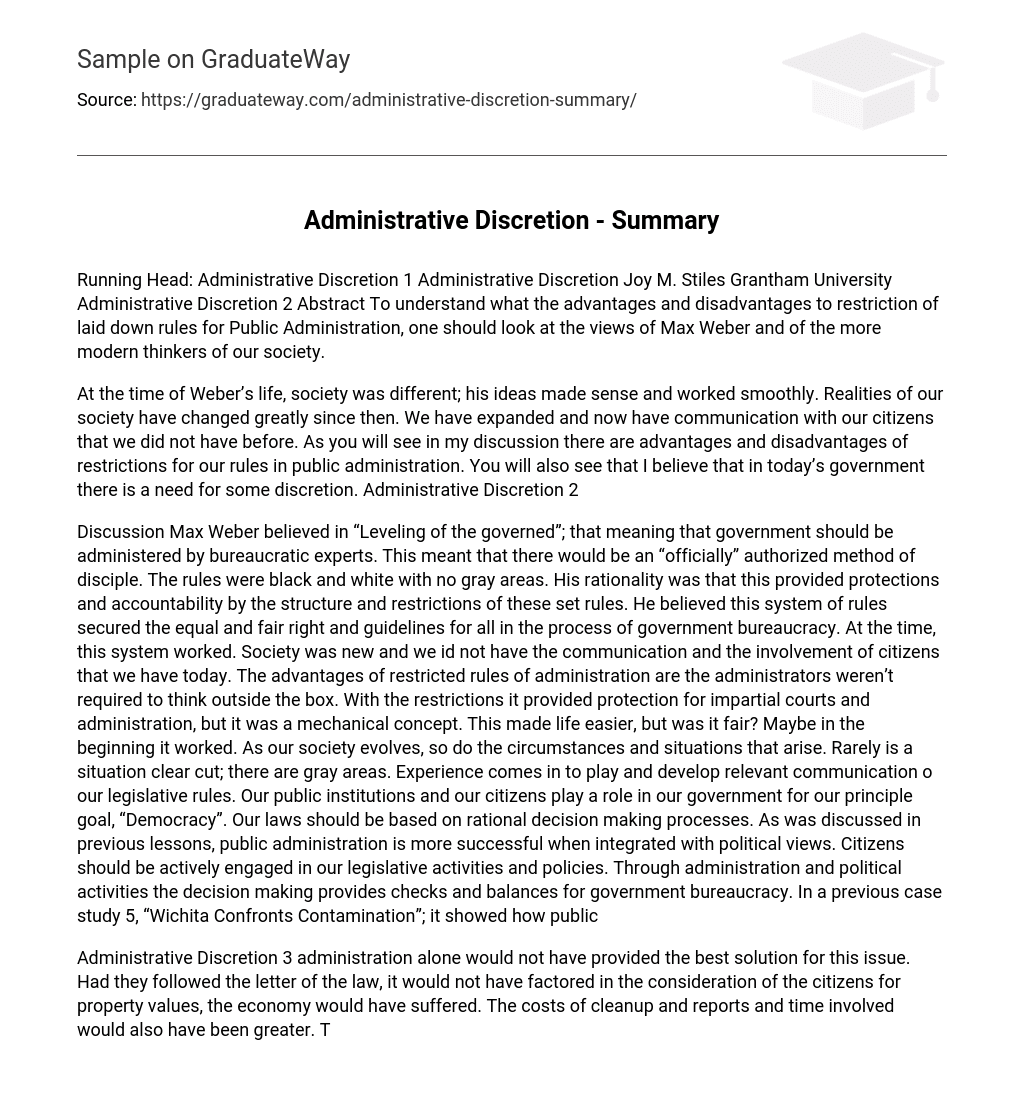Running Head: Administrative Discretion 1 Administrative Discretion Joy M. Stiles Grantham University Administrative Discretion 2 Abstract To understand what the advantages and disadvantages to restriction of laid down rules for Public Administration, one should look at the views of Max Weber and of the more modern thinkers of our society.
At the time of Weber’s life, society was different; his ideas made sense and worked smoothly. Realities of our society have changed greatly since then. We have expanded and now have communication with our citizens that we did not have before. As you will see in my discussion there are advantages and disadvantages of restrictions for our rules in public administration. You will also see that I believe that in today’s government there is a need for some discretion. Administrative Discretion 2
Discussion Max Weber believed in “Leveling of the governed”; that meaning that government should be administered by bureaucratic experts. This meant that there would be an “officially” authorized method of disciple. The rules were black and white with no gray areas. His rationality was that this provided protections and accountability by the structure and restrictions of these set rules. He believed this system of rules secured the equal and fair right and guidelines for all in the process of government bureaucracy. At the time, this system worked. Society was new and we id not have the communication and the involvement of citizens that we have today. The advantages of restricted rules of administration are the administrators weren’t required to think outside the box. With the restrictions it provided protection for impartial courts and administration, but it was a mechanical concept. This made life easier, but was it fair? Maybe in the beginning it worked. As our society evolves, so do the circumstances and situations that arise. Rarely is a situation clear cut; there are gray areas. Experience comes in to play and develop relevant communication o our legislative rules. Our public institutions and our citizens play a role in our government for our principle goal, “Democracy”. Our laws should be based on rational decision making processes. As was discussed in previous lessons, public administration is more successful when integrated with political views. Citizens should be actively engaged in our legislative activities and policies. Through administration and political activities the decision making provides checks and balances for government bureaucracy. In a previous case study 5, “Wichita Confronts Contamination”; it showed how public
Administrative Discretion 3 administration alone would not have provided the best solution for this issue. Had they followed the letter of the law, it would not have factored in the consideration of the citizens for property values, the economy would have suffered. The costs of cleanup and reports and time involved would also have been greater. This city would have been ruined economically. The city manager was able to make several plans involving bankers, the corporation that primary did caused the ontamination and various city officials. It was also able to work the issue through the KDHE keeping the EPA informed. Legislation was still involved as well as the city manager, legal counsel, city council, school board, lenders, city commission, EPA, KDHE, and governor. Although the case was solved without EPA in direct involvement, a solution was devised that satisfied all parties involved, using both the rules and discretion that was needed. They should be there as a guide and boundary as bureaucratic experts, but should not impede on progress and practical solutions that can save our society.
It is there for a form of protection, but should not stagnate possibilities for improvement or change to our laws. The rules should be a consensus of laws agreed upon by citizens and experts in accordance with the reality of our society’s structure and its changes. In conclusion we have a need for public administration and rules within a certain amount of discretion depending on circumstances and situations. Although Weber had a good idea during his time, society and its citizens have evolved. We participate more actively in government and have more communication to make changes or amendments through our elected officials.
Administrative Discretion 4 References Stillman II, R J (2010). Public Administration: Concepts and Cases, 9th edition. Boston, MA: Wadsworth Cengage Learning Jarvis, D (Unknown), Max Weber and Public Administration in Today’s Democratic Community retrieved from http://www. glendon. yorku. ca/english/faculty/researchcentres/api/ documents/maxweber. pdf Borgatti, S. (1996) Bureaucracy, retrieved from http://www. analytictech. com/mb021/bureau. htm





